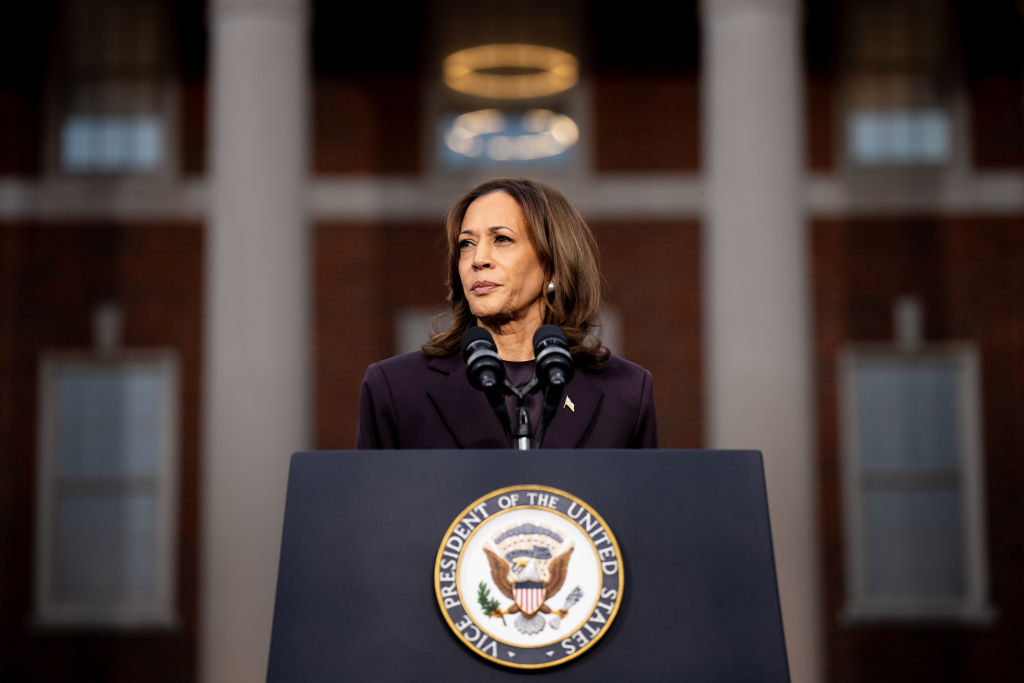In The Sound of Music, the nuns worry “how do you solve a problem like Maria?” when considering an obstreperous member of their convent. After Donald Trump’s convincing victory in the US election, the Democrats will now be asking themselves: “how do you solve a problem like Kamala?”
Except some Democrats don’t think Kamala is an electoral problem. Remarkably, there’s already talk among her aides that she could run for governor of California in 2026, and then return to the national stage in 2028. It’s hard to believe that the Democratic establishment would allow this, but the Harris campaign has been rather self-congratulatory after its recent failures, so it’s not impossible.
The Vice President’s team has been slow to admit that her failure was down to her lack of concrete policy measures and her cosying up to celebrities rather than normal folk. For many Democrats, she lost not because she was a uniquely terrible candidate, but because the voters — even Hispanics and black men — rejected her gender and race. What’s more, in their eyes, her inability to articulate anything substantive was not her fault but that of the Right-wing media.
Not everyone is fooled, however — and thankfully so. Let’s not forget that Harris squandered $1.3 billion on her failed presidential bid and is still in debt, continuing a longstanding tradition of poor management that includes the disaster of her failed 2020 campaign. “I think this disqualifies her forever,” mega-donor John Morgan complained this week.
The Guardian might believe that Harris could easily win the governorship, or simply build her national presence for a return engagement. Yet even in California she is not widely popular. She underperformed Biden in 2020 by two million votes, and this year lost the heavily Latino Inland Empire to Trump, marking a significant drop-off.
Should she run in her home state, Harris’s candidacy will be seen widely as a consolidation of Gavin Newsom’s agenda. She owes her career to the Bay Area ruling clique and, as California’s attorney general, backed policies on environment and housing which proved disastrous for most middle- and working-class people. This was confirmed in a study by the California Air Resources Board, the primary executor of California’s climate agenda. Her policies hurt those earning less than $100,000 annually, while boosting incomes for those above this threshold.
Inevitably, Harris will copy the current Governor in turning the state into a centre of resistance to Trump’s policies. On energy, she will continue what attorney Jennifer Hernandez calls the new era of “Green Jim Crow”, which raises prices of goods and shrinks blue-collar pay. Such policies have turned the Golden State into one of the country’s most unequal: California has the largest population of billionaires, but also 30% of the country’s homeless, the highest percentage living in poverty, and the widest gap between middle- and upper-middle-income earners. If this were to become an election issue, as it should be, Harris would be vulnerable.
Of course, she may not have an easy time being nominated. Several candidates, notably Attorney General Rob Bonta, will run on an anti-Trump manifesto. Then there are potential Asian, Hispanic and black entries to challenge the identity vote, while Lt. Gov. Eleni Kounalakis has oodles of dollars from her land developer father.
Yet if Harris can clinch the nomination, she will most likely win the election. Californians continue to elect Democrats, even while recalling Left-wing prosecutors and overturning the judicial reforms which Harris embraced as attorney general. The lack of a functioning Republican Party also works in her favour.
With Harris at the top of the ticket, the supremacy of climate catastrophism and identity politics over the party’s former emphasis on working- and middle-class economics will continue. A Harris governorship would make Californians pay through the nose, just so the Democrats can thumb theirs at Trump.











Join the discussion
Join like minded readers that support our journalism by becoming a paid subscriber
To join the discussion in the comments, become a paid subscriber.
Join like minded readers that support our journalism, read unlimited articles and enjoy other subscriber-only benefits.
Subscribe